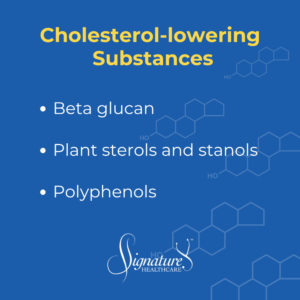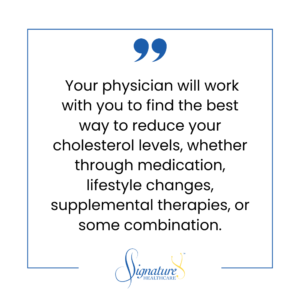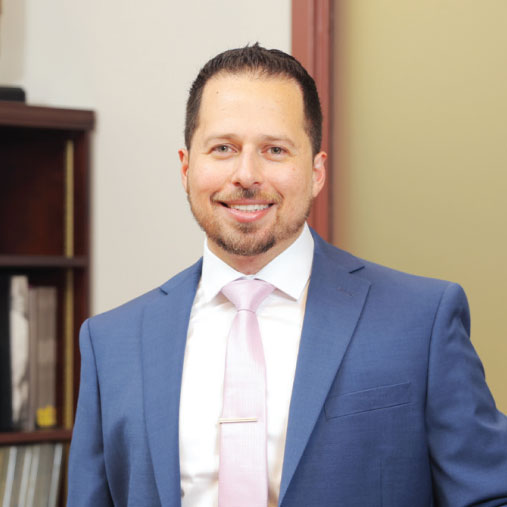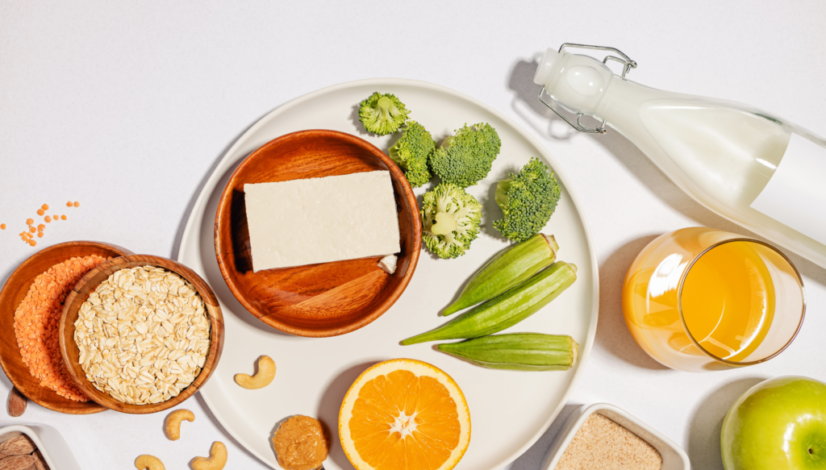What Can I Take Instead of Statins to Lower Cholesterol?
“What can I take instead of statins to lower cholesterol?”
We often hear this question from patients, especially those under 45 who may suddenly discover elevated LDL (“bad”) cholesterol levels.
If we determine your cholesterol levels need lowering, we work with you to set goals. Often, we choose to treat unhealthy cholesterol levels with statins — exceptional medications proven to reduce the risk of first or recurrent heart attacks, strokes, hospitalizations, and cardiovascular deaths. If your genetics cause your excessive LDL levels, we can typically manage the issue with prescription statins and lifestyle adjustments like diet and exercise.
Occasionally, though, you may be better off with a statin alternative.
When Statins Aren’t Needed
Who’s a candidate for an alternative to statins? Perhaps that under-45 patient who’s learned their “bad” cholesterol is increasing unchecked. They’re eager to improve their metabolic profile, reduce the risk of plaque in their coronary arteries, and perhaps reverse plaque that’s already formed.
For these patients, we’re talking about primary prevention; in other words, their heightened cholesterol has not yet caused an adverse atherosclerotic vascular disease (ASCVD) event — heart attack, stroke, or peripheral vascular disease affecting circulation to an organ. In these cases, statin alternatives may be appropriate.
Patients who’ve already experienced an ASCVD event move to secondary prevention, a more structured way of reducing cholesterol. For them, we prescribe statins or other well-regulated FDA-approved medications.

If you’re in the primary prevention stage and wondering, “What can I take instead of statins to lower cholesterol?” consider these treatment options:
Diet
For decades, the medical community has recognized and recommended certain nutritional approaches — the Mediterranean diet, the DASH diet, vegetarian and vegan diets, etc. — that emphasize soluble fiber, nuts, fruits, vegetables, and animal protein alternatives like soy.
These diets also contain beneficial cholesterol-lowering substances like:
- Beta glucan: Beta glucan is a common soluble fiber in supplements and certain foods like oats. It forms a gel-like substance in the intestine, preventing the gut from absorbing cholesterol. Less absorption means less cholesterol in the bloodstream.
- Plant sterols and stanols: Found in fruits and vegetables, plant sterols and stanols have a molecular structure similar to cholesterol, and they inhibit cholesterol absorption at the gut level.
- Polyphenols: These molecules, present in legumes, fruits, and vegetables, provide antioxidants that decrease the inflammatory cascade that forms plaque on artery walls.
Low-carb diets, often recommended to encourage weight loss, can also reduce cholesterol levels and benefit people with insulin resistance, prediabetes, diabetes, or high triglycerides.
Although other diets — such as paleo or keto — may be effective for weight loss, they tend to be high in saturated fats, so we don’t recommend them for patients with elevated LDL cholesterol or triglycerides.
Supplements and Natural Remedies
If you’re asking, “What can I take instead of statins to lower cholesterol?” you may be considering a natural supplement. Before trying one you found on Google, ask your Signature Healthcare physician to evaluate the supplement’s ingredients.
Supplements aren’t FDA-regulated, so you must be careful about what you buy and from whom. Plus, we can’t validate a particular supplement or provider if we don’t know the product’s contents. Turn to your physician for advice before trying one.
For example, you may hear a lot about omega-3 fatty acids, found in supplements, nuts, and fatty fish like salmon and mackerel. Can they effectively treat high LDLs? Not really. They’re good at reducing triglycerides and may reduce LDL cholesterol in some patients, but others may see increased LDLs.
Here are some agents that may have cholesterol-lowering properties but should be used only with your doctor’s advice:
- Red Yeast Rice Extract (RYRE): Already well-known to many patients as a statin alternative, RYRE contains sterols, healthy fats, and monacolin K, the same active ingredient found in a statin called lovastatin (although in much lower amounts). However, it may cause side effects, including cramping.
- Berberine: Found in various fruits, roots, and barks, berberine is also available as a supplement. It contains the active ingredient in PCSK9 inhibitors, one of the newest cholesterol-lowering medications available today. PCSK9 inhibitors up-regulate the LDL receptors — the “trashcans” that remove LDL-cholesterol particles.
Berberine may help reduce LDL cholesterol by an estimated 25 points. It may benefit people who can’t tolerate statins or are in secondary prevention but aren’t reaching their cholesterol-level goals. It may also help patients with familial hypercholesterolemia, a genetic predisposition to high cholesterol, as a supplement to statins.
- Probiotics: Research is still needed on probiotics, but they’re safe and effective for aiding digestion, producing vitamins, and rendering other benefits to the gut beyond possibly reducing cholesterol.
Non-Statin Prescription Medications
Some available non-statins compare well to statins in terms of effectiveness and low side effects:
- Ezetimibe (brand name Zetia): Used alone or to supplement a lower statin dose, this medication can reduce LDL cholesterol levels by 20–25%. It’s been shown to improve patient outcomes, like the recurrence of a heart attack or the avoidance of a first one. Because it blocks cholesterol absorption at the gut’s level, its most common potential side effect is fatty, loose stools.
- Bempedoic acid: This novel agent works like a statin but is more localized to the liver. It up-regulates the LDL receptors to reduce cholesterol production and remove it from the bloodstream. Bempedoic acid typically doesn’t have the adverse muscular effects that may occur with statins; however, it shouldn’t be taken by patients with high uric acid levels who treat gout with diet, as it can encourage hyperuricemia.
A Word About Exercise
Whether a patient is treating high LDLs with prescription medication or supplements, we also recommend moderate-intensity aerobic exercise, which increases respiratory and heart rate and burns fat.
Moderate intensity means you shouldn’t be able to talk comfortably during the workout (sorry, chatting with a friend on a leisurely walk doesn’t qualify!). As you build your aerobic tolerance, work toward completing at least 150 minutes of exercise per week — a reasonable goal and the minimum recommendation to induce weight loss and reduce cholesterol levels.
High-intensity interval training (HIIT) is an especially effective fat-burner. It requires greater exertion but fewer hours at the gym and can successfully spur weight loss and lower cholesterol.
Work With Your Doctor
If you’re diagnosed with high LDL cholesterol, resist the temptation to take supplements without first informing your primary care physician. Your physician will work with you to find the best way to reduce your cholesterol levels, whether through medication, lifestyle changes, supplemental therapies, or some combination.
High levels of bad cholesterol create adverse narrowing or atherosclerosis of the arteries, reducing blood supply to the brain, heart, kidneys, and other major organs. We use advanced imaging to assess your risk.
If the images show plaque formation in the coronary arteries and you can’t tolerate statins, we may recommend a dietary supplement paired with non-statin medications and lifestyle (diet and exercise) adjustments. We then schedule follow-ups to carefully track your progress and ensure any treatment path you take is effective at lowering your cholesterol and reducing or stabilizing plaque formation.

You Can Fight “Bad” Cholesterol
We encourage patients of all ages and circumstances to work with their Signature Healthcare primary care doctor to determine their cholesterol levels and what they should be.
If you’re treating high LDL and asking, “What can I take instead of statins to lower cholesterol?” trust our team to help you find the right treatment. Reach out today to take control of your health.

Dr. Andrés Sánchez
Dr. Sánchez is board-certified in Internal Medicine. Originally from Medellin, Colombia, Dr. Sánchez immigrated to Miami, FL at the age of 11. Dr. Sánchez obtained a Bachelor of Science Degree in Biochemistry from the University of Florida, went on to receive a Dean’s Fellowship to earn his Doctor of Medicine Degree at the University of Rochester School of Medicine, and completed his internal medicine residency at Yale University.
What drives Dr. Sánchez’s way of life, including his practice of medicine, is his Christian faith, which encourages him to exercise grace and compassion in the care of his patients. He enjoys playing the cajón and spending quality time with his wife Cristina, son Caleb, and his church family. Dr. Sánchez makes it a priority to keep up-to-date with medical knowledge and biotechnological advances because he understands how the timely application of these can translate to relieve the suffering of his patients. Dr. Sánchez is fluent in English and Spanish.
Get the latest News
Join the Signature Healthcare Newsletter to get the latest articles, resources, and news delivered directly to your inbox.

